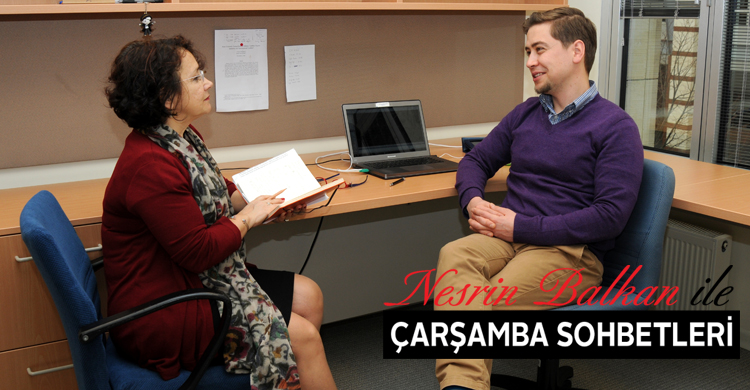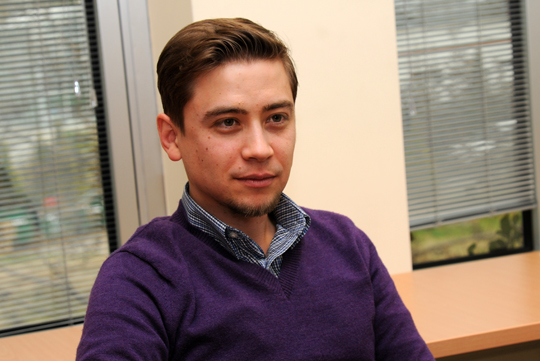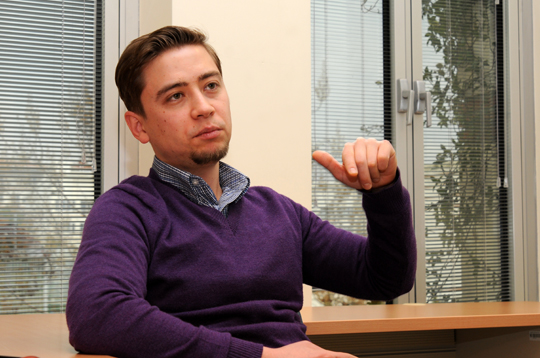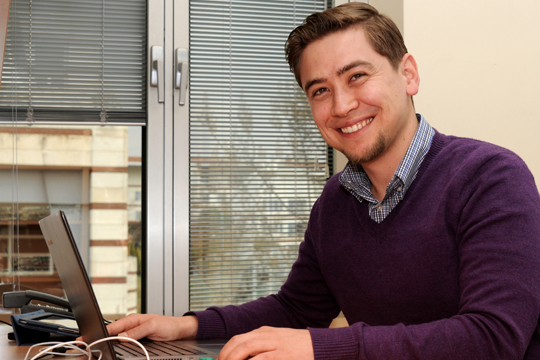01/02/2015
Kerim Can Kavaklı: “It makes no sense to force an eighteen-year-old to choose what they want to be in life and keep them from changing their mind ever again. Sabancı University pulls you out of this mess.”

Wednesday Talks with Nesrin Balkan
You have been a lecturer here for six months. In your opinion, what makes a good professor?
I think one needs to prepare. I took countless courses, some of them from the best professors in the field. I learned much from them. Some others were celebrities; everyone knew them and they had the most impressive résumés, but they weren’t good teachers. I think the difference is between how much you want to give a lecture and how seriously you take it. Being an academic has two aspects: research and teaching. At the most prestigious research universities in the US, academics receive most of their awards with their research work. Even if you are not a great teacher, you can continue your academic career at Harvard, Princeton or Rochester and still reach high places. Some others place a lot of importance on the other aspect as well.
You mean giving lectures.
Yes; when an academic loves to lecture and is enthusiastic about it, you as a student gain much from them. It matters to give something to the student, and also pay attention to them as human beings.

Communication is important, right? Regardless of your subject, you are trying to teach someone something, or at least make them have questions about it. I remembered my high school philosophy teacher. She would steer the lesson to such a point that the whole class would start asking questions.
In social sciences, we don’t want to overload the students with a mass of information, because the world is in constant change. The information you teach today may be irrelevant tomorrow. So instead of teaching people things, we try to show them how to learn, what methods to use, how to investigate the truth of an argument, and what questions to ask. I’m sure this is different in natural sciences because there are universal rules; there is a book, and if you study that, you can build a bridge. This doesn’t change over time and you have to learn it by heart; you need to know how to use the formulas they give you.
So you say things are different in social sciences.
Yes, because the society keeps changing.
You are among the first students at Sabancı University. In the first academic year, in 1999, there were just 250 of you on the entire campus. Faculty and employees outnumbered you. Did you enjoy this?
It had its good and bad sides. For instance, there were few shuttles. I would go home for the weekend so I could socialize in the city, but it was tough if you were living on campus. Not many people came to the campus either. We didn’t have the Performing Arts Center. Today, there are half a dozen or more events every month. A center like that wouldn’t have survived back in the day even if we were to buy tickets to every show. Now there are a lot more students and a lot more amenities. This is an economic development. But being so few had its advantages too. We could do anything we wanted; the resources were there and there were no predetermined structures. You wanted a music club, you set one up. And whatever you thought you needed for that club was purchased new. In the beginning of this semester, there was a student clubs event outdoors, and as I was walking past the music club booth, a student called asked me whether I would like to join. I said, “I founded this club myself; I am a founding member.” That was the nice part. You could to whatever you wanted and steer the clubs in the direction you wanted.

Like building from scratch.
That’s exactly what we did.
What did you do as the music club?
We had a band and we would play in festivals.
Do you still play music?
No, I only listen to it now.
What would your advice be for high school students looking to enter university?
I would definitely recommend Sabancı. I think Sabancı’s greatest advantage still is students’ ability to make their own diploma program choices. This is an excellent opportunity and the right thing to do. This sets us apart from most other universities in Turkey. I encourage everyone to make use of this. This saved me and some of my close friends. I had joined Sabancı to study economics. Then, I realized that economics was the last thing I wanted to study. If I had remained in the program, I would have been a mediocre student and started a job right after graduation. I would never have sought an academic career. I wouldn’t be a good student either. I couldn’t have achieved this position in my career. I am greatly satisfied with my choices right now. I have friends who started in the Faculty of Engineering and Natural Sciences and then moved to Visual Arts, enjoying great success and starting their own design offices. I have friends who are academics abroad. Almost all of us finished the school in a program different from the one we started in, where we found ourselves. It makes no sense to force an eighteen-year-old to choose what they want to be in life and keep them from changing their mind ever again. Sabancı University pulls you out of this mess.

Not allowing a change of mind makes students unhappy.
The end result is people who don’t like or want to do what they do; people who study a subject they don’t want for four years, and then start anew. This is a waste of money, time and energy for everyone. So if they can make it to Sabancı, I definitely recommend them to come here. We are great at whatever program we have to offer, which is another great benefit.
Can you talk about the social and political sciences program and interdisciplinary structure?
SPS at Sabancı is a great example of interdisciplinary structure. If this program were in another school, its students would be sitting in different rooms, taking different courses. Here, students may take courses from a variety of disciplines and I think this is great in terms of education. Disciplines in social sciences are separated according to subject or methodology. Let’s consider psychology, which focuses on what goes on in people’s minds, how individuals act, and what their mental situation is. These are what a psychology student spends most of their time on. If you want to understand the society at the same time, it is greater than the sum of all individuals, and has its own dynamics. In this case, you have to consider sociology, where methods are different altogether. If you focus on sociology, you miss out on psychology courses and are unaware of psychological approaches. Psychology is about the mental aspects of the individual, but then there is economics, which also concerns the individual. If you go in that direction, you miss out on psychology and sociology, and so on.
I think social sciences is going in a direction where academics learn about research methods, tools and approaches in a variety of subjects and apply these to all the issues that face them – in other words, they step out of their native discipline, or establish interdisciplinary links.

The interdisciplinary structure at Sabancı University is much more relevant to real life.
I agree. I think this is getting better for students at Sabancı University. For instance, I have a PhD in international relations and the articles in my dissertation were on why countries go to war or why Turkey gives foreign aid to other countries. I recently took part in a conference which was not exclusive to social scientists but appealed to all social sciences using experimental methods, and was an exciting event. There was a category called “decision science,” which studied how people make decisions.
A PhD student and I decided to conduct a project on community volunteers in Turkey; why they volunteer, how they volunteer to do more, and what factors influence this. I find this interesting and fun. I may have studied international relations for a long time, but the methods and approaches that are available to me at Sabancı University are conducive to a study on why students volunteer. I want to apply these methods and approaches to this data. I believe that in the future, people will begin calling themselves social scientists or human scientists instead of sociologists or psychologists. Towards this end, Sabancı University is the best place in Turkey for students to gain this ability. We don’t just give them a choice, we also give them education with a wider and more innovative scope.

What are your plans for the future?
I plan to stay at Sabancı University for a long time; I’m very happy here and this is a great place to be an academic thanks to facilities provided and the institutional culture. I know from other places I’ve visited that the culture and personal relationships may not be as good as they are here. There are people here who understand, respect and value the work I do. Student quality is high. That is why I want to stay here. We need to come up with some projects while I do that. Recently, a project on NATO was approved, so we have that to do. I will continue to publish articles related to my dissertation; we will look into our SAP projects and so on. So I plan to give lectures while I write on whatever comes up, whatever inspires me.
So as a member of Sabancı University faculty, you are able to pursue your personal development. You are happy to be in a culture you find to be right, together with extraordinary students and colleagues.
Yes. Here, people treat each other with respect, and I always look forward to coming to work every day. I work in my office all day – I don’t need to do that; I can work in my apartment here, or back home in Istanbul. But I love being here and that is important.
This is a fine community to be in.
Yes.
Thank you for the interview.





